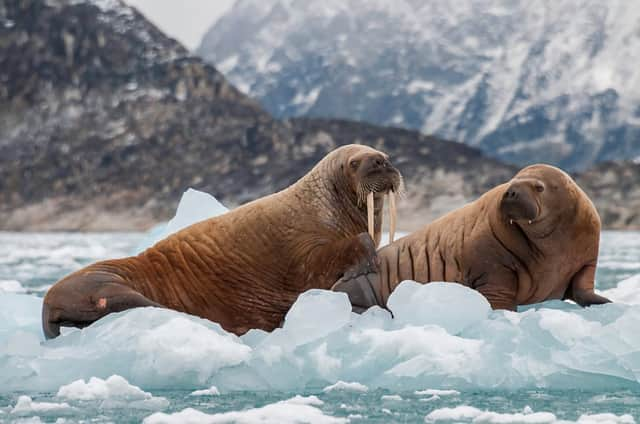How to become a ‘walrus detective’ as WWF calls for public to help with conservation research


The World Wide Fund for Nature (WWF) is looking for members of the public to become “walrus detectives” in a bid to help researchers understand more about the population of Atlantic and Laptev walruses.
With the climate crisis impacting the Arctic in a significant way, conservationists need to learn more about how walruses are being affected.
Advertisement
Hide AdAdvertisement
Hide AdThis is everything you need to know - and how you can become a walrus detective.
What is Walrus from Space?
Walrus from Space is a census created by the WWF in partnership with the British Antarctic Survey (BAS).
The WFF and BAS are asking members of the public to help contribute to conservation science by searching for walruses across thousands of satellite images taken from space.
The project aims to carry out a census of Atlantic and Laptev walrus populations over the course of five years, which will help scientists identify any changes over time.
Advertisement
Hide AdAdvertisement
Hide AdSatellites in space are continuously taking images of the earth, and using these high resolution pictures, it is possible to identify, count and later estimate how many Atlantic and Laptev walruses there are at certain locations.
The benefit of using this method to track the walruses is that satellites do not disturb the animals, and are able to cover vast areas at once, many of which would not normally be available to access.
Rod Downie, Chief Polar Adviser at WWF, said: “What happens in the Arctic doesn’t stay there; the climate crisis is a global problem, bigger than any person, species or region.
“Ahead of hosting this year’s global climate summit, the UK must raise its ambition and keep all of its climate promises – for the sake of the walrus, and the world.”
Advertisement
Hide AdAdvertisement
Hide AdHannah Cubaynes, a research associate at the British Antarctic Survey, said: “Assessing walrus populations by traditional methods is very difficult as they live in extremely remote areas, spend much of their time on the sea ice and move around a lot.
“Satellite images can solve this problem as they can survey huge tracts of coastline to assess where walrus are and help us count the ones that we find.
“However, doing that for all the Atlantic and Laptev walrus will take huge amounts of imagery, too much for a single scientist or small team, so we need help from thousands of citizen scientists to help us learn more about this iconic animal.”
How are walruses being impacted by climate change?
Walruses are being affected by climate change in a big way, with the climate crisis warming the Arctic region almost three times faster than the global average.
Advertisement
Hide AdAdvertisement
Hide AdGlobal warming is melting the ice that walruses rely on, and forcing them to rest on land, as opposed to sea ice, could cause the creatures to swim further and use up more energy to reach their food and reduce the region that they can search.
The food that they eat is also being affected by climate change, with the Arctic Ocean becoming more acidic as it absorbs carbon dioxide. This makes it difficult for animals like clams, sea snails and crabs - the main prey of the walrus - to build their shells.
The WFF says: “As the Arctic is a vast and changing place we simply don’t know enough yet about how many walrus there are, the trends in their population and how the climate crisis is affecting them.”
How do I become a walrus detective?
You can help the WWF and BAS by spending as little as 30 minutes searching for walruses in the satellite images.
Advertisement
Hide AdAdvertisement
Hide AdIt is hoped that half a million people will sign up to become walrus detectives, and that over the next four years everyone’s collective efforts will help researchers understand how quickly and how seriously the climate crisis is affecting walrus populations.
“The information gathered with the help of the public for this project, coupled with the knowledge of other research groups and local and Indigenous communities of the Arctic, will be crucial to our conservation efforts,” the WWF says.
All you need to take part in the census is access to a computer or tablet and an internet connection.
The minimum recommended age for participating in the survey without adult supervision is 10 years old, and all participants under the age of 13 will need parental consent to get involved.
To become a walrus detective you’ll need to create an account on the WWF website and watch a short tutorial.